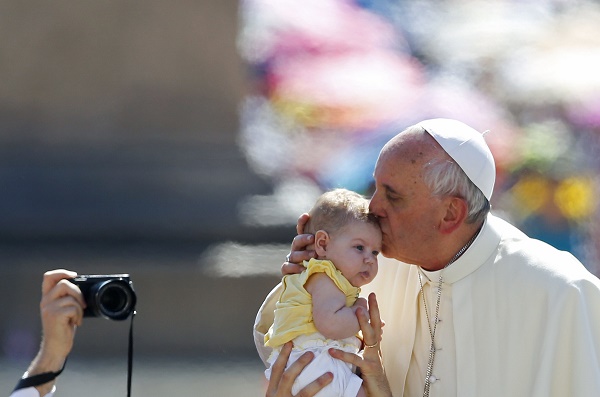
Author's note: This was originally published on my personal blog in December 2013, when the liberal world was on a wave of Popemania. That wave is returning with the apparently exciting news that the pope thinks we have a responsibility to look after God's creation, making him an eco-warrior in the eyes of the likes of George Monbiot. I just don't buy it. More specifically, I think the only difference between Francis and his predecessor, the much-criticised Benedict, is that Francis is a better PR man. I'm probably too Catholic to ever fully trust any Pope.
In the week when Pope Francis won the approval of no lesser organ than the Times of London, named as the newspaper’s person of the year, a story emerged from Australia that dented the new Bishop of Rome’s previously pristine reputation amongst non Catholics.
Francis was moved to excommunicate an Australian priest called Greg Reynolds. Reynolds had set up something called “Inclusive Catholics” and is known to be an advocate of same sex marriage and the ordination of women. He resigned from his parish duties in 2011 and had his priestly faculty (his ability to administer the sacraments) removed.
Late this year, after reports that he had not only expressed support for gay marriage, but had officiated at a ceremony where a dog was given the Eucharist,Reynolds was kicked out of the church for good, on orders from the Pope.
Reynolds apparently said “I am very surprised that this order has come under his watch; it seems so inconsistent with everything else he has said and done.”
The ex-priest has come up against two conflicting ideas here. That of the New World Pope as a cuddly pastor, and the very simple fact that rules is rules.
Francis has been a public relations triumph for the past few months, and this has largely been down to his eschewing of the gilded trappings of the Holy See. Francis, we are told, called his own newsagent to cancel his subscriptions when he moved to Rome from Buenos Aires, prefers a simple saloon to a Popemobile, and lives in a modest apartment in the Vatican. He’s had breakfast with homeless men, and even went to far as to chuck out the papal ruby slippers in favour of orthopaedic shoes.
All well and good, but nothing the church says under Francis is significantly different from what was said by his predecessor. Social justice on poverty, no to war and the death penalty, and no to abortion, homosexual acts and ordination for women. Benedict was thoughtful about these things, but he was also a Vatican man, who felt that the splendour of the church was part and parcel of the message.
It’s an old-fashioned idea, replaced in much public discourse now by a demand for tasteful understatement.
But we should be wary of conflating taste and decency. When David Cameron lectured the nation on austerity from a white-tie dinner at Guildhall, replete with golden furniture, we recoiled at his cheek. But would it have been better if he’d delivered the same speech from an Ikea kitchen table? How much does it matter?
We all too easily fall into the trap of thinking people whose lives look even remotely like ours probably have the same interests too. As ever, it’s worth looking beyond the trappings to pay attention to the power structures, and to what people in power are actually saying. Pope Francis may speak in soothing tones, but the message is the same. He may not drive a Popemobile, but he’s definitely still the Pope. Ostentatious austerity is a dangerous distraction.